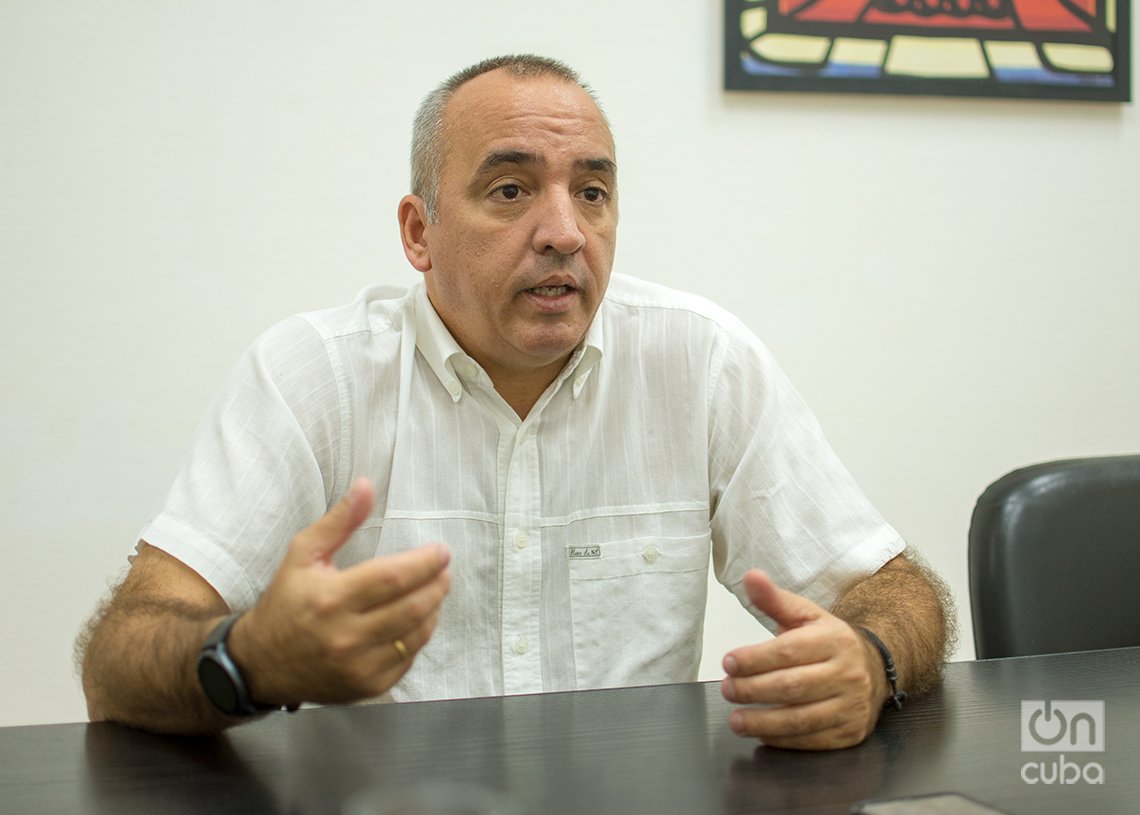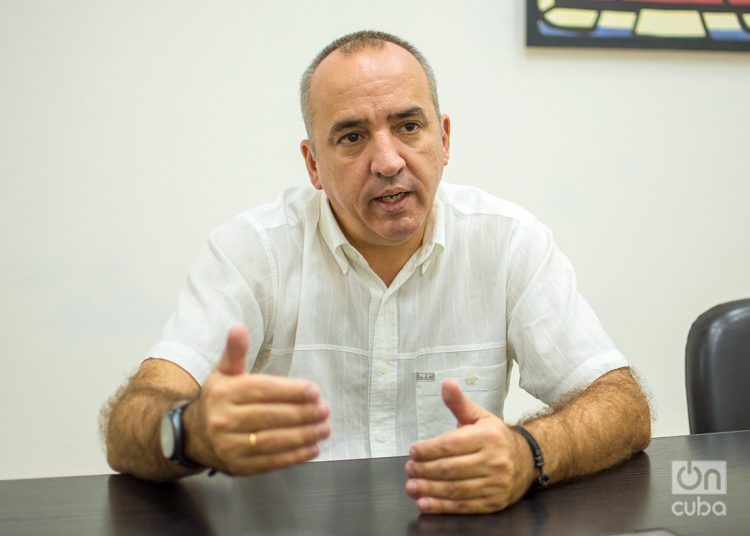In just a few days, on November 18 and 19, Havana will host the 4th The Nation and Emigration Conference, the main event for dialogue between the island’s authorities and members of the Cuban community residing abroad.
The meeting, initially called for 2020 and postponed due to COVID-19, will be held almost twenty years after its previous edition (2004); in a very different scenario than then, in the midst of a severe crisis and changes in the economic framework; furthermore, at times of a migratory wave of Cubans to other countries — especially the United States — and after the government’s gradual implementation of new immigration measures.
The event, even in such a difficult context ― reinforced by the impact of the pandemic and U.S. sanctions ― is defended by the authorities as part of the necessary “strengthening of ties” between Cuba and its emigrants and as a space to “continue moving forward” through debate and exchange with Cubans living abroad.
Ernesto Soberón, general director of Consular Affairs and Attention to Cubans Living Abroad (DACCRE) of the Cuban Foreign Ministry, emphasized this in an interview with OnCuba. The diplomat referred to the event not as an end in itself, but as “one more step on this path of rapprochement” and an opportunity to identify and debate pending issues in this relationship.
Until Friday, November 10, a week before the start, some 290 Cubans residing in more than 40 countries were digitally accredited. However, it is expected that the number of attendees will be close to 400, based on the invitations issued and the intentions to participate received.
We spoke with Soberón about the development of the Conference, its participants and main themes, its possible results and the perspectives that open after its holding.
How many and which Cubans residing abroad will participate in the meeting?
We estimate a participation of between 300 and 380 in-person participants in the Conference, although there is a larger number of people who have confirmed their desire to be in Havana and there are unconfirmed guests, whose presence we do not rule out. As the event approaches, we will be able to have a clearer idea; but beyond the final numbers, it will be a significant presence.
Participants will cover the entire spectrum of Cubans residing abroad. There is everything. It is one of the big differences compared to previous meetings, as is the high percentage of participants who have a residence abroad and also in Cuba. If we take into account those who had been accredited until Friday, that percentage is close to 50%. It is the result of the immigration policy implemented by the Cuban government and the circularity it encourages.
As is traditional, there will be an important presence of artists, intellectuals and representatives of the cultural sector, which has always been fundamental in the links between Cuba and its nationals abroad. This time there will also be a relevant presence of businesspeople, due to the measures that have been promoted for their incorporation into the Cuban economy and the interest of that sector to participate more in business projects in Cuba.
It is worth highlighting the closeness in time of the Conference to the Havana International Trade Fair and the Cuba Va Conmigo Festival, which have among their leading participants Cuban businesspeople and artists who live abroad. This encourages the Conference to have participants in these events.
Holding these events almost simultaneously had not happened before and gives a measure of the progress and current state of relations with Cubans residing abroad.

Is this diversity reflected in the criteria, even political, of the participants? How much can they represent the rest of the Cuban emigrants who will not be at the Havana meeting?
The dialogue that will take place at the Conference will not be with representatives of Cubans abroad, because they do not come to represent others, but with a group that we consider representative of the Cuban community abroad. We are talking about people with different realities, interests, points of view…, with different positions, even political positions.
We have no problem with this diversity of criteria. The position of the Cuban government has been the same since the 1978 dialogue and there has always been diversity of thought among the participants in these conferences. Now, the lowest common denominator will always be the defense of the sovereignty and independence of Cuba. It is so in this Conference, it was so in the previous ones and it will be so in the next ones.
On that basis there is a diversity of thoughts and opinions, and that diversity will be represented at the Conference, as it will surely be seen in its sessions.
There are no taboo topics in this dialogue, as we have said on many occasions, as long as we start from that basis. There may be issues that will be resolved before, issues that will be resolved later, issues that remain pending; but we are able to dialogue on any topic and recognize the validity of one point of view or another, even if there are differences between them, or between them and ours.
Will it only be in person or will there be online access?
It will be mainly in person. We have an online modality, but more than participation it will be monitoring the event. As is known, our obstacle is the inability to access Zoom from Cuba, due to the restrictions imposed by the United States blockade.
However, the Conference will have press coverage and participants will surely make podcasts with their cell phones; although it is important to consider in these cases respect for the privacy of others. From previous experiences we know of people who have suffered retaliation for having participated in events like this. It is necessary to take that into account when making videos and publications. It will depend on the will and desire of the participants.
Subsequently, as simultaneous remote participation online will not be possible, we will open communication channels through our platforms and offices, to receive feedback from those who are not present in person.

What will be the main lines and themes of the Conference?
The event is conceived in four moments of exchange, focused on four major themes, which will coincide with the morning and afternoon sessions of the two days in which the Conference will be held.
In these sessions we will have exchanges on immigration policy and attention to Cubans residing abroad; on identity and cultural policy linked to Cuba’s relations with its compatriots abroad; a third moment will be dedicated to business opportunities, the economy and commercial issues; and a fourth moment will be linked to the development of technologies and how that influences relations with Cubans abroad.
This last topic is one of the great novelties regarding previous conferences and the setting in which they were held, based on technological and connectivity development and the advances in Cuba in this direction in recent years. We also intend to talk about how these technological tools can contribute to providing an objective image of the Cuban reality, with its lights and shadows.
The government has reiterated that the Conference will be a space to dialogue with Cubans residing abroad. What will the dynamics of the event be like and what can be expected from its development?
First, in these topics, we will take stock of what has been done so far. It is important to be able to appreciate what has been achieved. But a second, very important moment is where we want to go.
The Conference will be a continuity of the dialogue that has been taking place not only in recent times, but since 1978, in previous conferences and other meetings of emigrants, and comes to complete a stage in which there have been important announcements regarding immigration policy.
The idea is that most of the time will be spent in debates and that, based on the presentation of these topics, an exchange will be generated that allows reflection and opinions, knowing the criteria and proposals of the participants and facilitating the collective construction of what we want to do so that these debates are useful and beneficial for everyone.
What will happen at the Conference regarding the topic of the economy, one of the main ones as announced?
In terms of business and investments, even when there are current regulations and publications that explain them, it is important to address the issue with Cubans living abroad, because reading it in the press or on the Internet is not the same as when an authorized source directly gives those explanations. This is why the main modifications in economic matters will be explained and what opportunities they open for the participation of those residing outside of Cuba.
There are no limitations from a legal point of view for the insertion into the Cuban economy of any compatriot living abroad. If you have a company and legal status in another country, you can do business and invest in Cuba without limitations of any kind. If you are also a resident in Cuba, you can also have an MSME and do business and link up through it with other economic actors, both state and non-state.
Now, that does not mean there are no obstacles in Cuba and in the countries where they live, particularly in the United States, that make these ties difficult and hinder their greater presence in our economy. The numbers show that their presence is growing compared to years ago, but it could be greater. That is why we want to address the issue and debate the existing obstacles, those from here and those from abroad, such as the issue of the transfer of funds, both to Cuba and from Cuba, and see what we can do to get around them, overcome them and that their contribution is greater.
Meeting with emigrants to boost their participation in Cuban economy
After almost twenty years since the previous edition, the Conference will be held at a time of crisis and transformations in the country, and a strong wave of migration. What perspectives can be opened with its holding?
The Conference itself is not the end. It is one more step on this path of rapprochement, one more means to achieve the goal we pursue, which is to continue strengthening ties with Cubans abroad.
However, its holding is important and indicates that, even with what progress has been made, there are still pending issues that we have to resolve and on which we must insist. We want to point out those topics and identify those that we have not identified in this reality that we live in today, which is completely different from that of the three previous conferences. And from there make more progress.
Within what is going to be dealt with and discussed, there are several topics under study, such as the moratorium in force since the pandemic for staying outside the country for more than 24 months without losing Cuban residence, and there are regulations in the process of being drafted, such as the law of citizenship, and that of migration. We are also going to exchange and listen to opinions about that.
I have no doubt that the Conference will mean progress. Above all, it will project how we want to advance in one area or another of relations with Cubans abroad because in the two days of the event, not all pending issues or concerns can be resolved.
There will surely be proposals that will require more time and analysis to materialize; others may be able to be implemented more quickly. But, I reiterate, the idea is to make the most of the event to exchange with Cubans abroad, listen to their opinions and proposals, to outline together where we can continue moving forward; and also provide them with information that they can then take to their countries of residence and share with other Cubans there, and encourage exchange based on what is talked about and debated in Havana.










